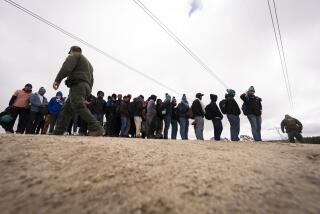U.S. Officials Defend Detention of Cuban Refugees as Minor Policy Shift : Immigration: Atty. Gen. Reno insists the 1966 adjustment act is not being revoked. Instead, the government is changing how the law is applied, which will slow processing.
WASHINGTON — Justice Department officials Friday defended the legal basis for changing U.S. immigration policies toward Cuba and made clear that they are trying to stop all refugees except the 3,000 who immigrate legitimately each year through an American consular office in Havana.
Atty. Gen. Janet Reno insisted that the Clinton Administration is not revoking the 1966 Cuban Adjustment Act by which Congress granted favored treatment to refugees from the regime of Cuban President Fidel Castro.
Reno and others said the new policy simply changes the way the act is applied--holding would-be immigrants in detention centers while their cases are pending, rather than releasing them immediately into American society, as had been the case under the old policy.
“The government has the authority to detain anybody who illegally enters this country and we are exercising that authority again for the purpose of making sure that Castro knows he’s got to solve his problems at home,” Reno said.
Under provisions of the Cuban Adjustment Act, a Cuban native or citizen could almost automatically get permanent-resident status in the United States a year after reaching U.S. shores. Although the Immigration and Naturalization Service had to approve an immigrant’s “green card” application, this occurred routinely if the immigrant had no criminal record or serious health problems.
Four years after that, the refugee could expect to get U.S. citizenship.
For those who continue trying to reach U.S. shores in rickety boats, officials offered no promises of speedy processing--only the specter of months in detention at the U.S. Navy’s Guantanamo Bay base in Cuba if they are intercepted by Coast Guard patrols.
The smaller number who manage to reach Florida will face a similar period in detention centers there, they said.
Thousands of Cuban immigrants risked the dangerous 90-mile trip across the Florida Straits--rather than simply seeking refuge at Guantanamo--mainly because the congressional act requires Cubans to reach the United States to obtain permanent-resident status.
Stephanie Marks, an official of the Lawyers Committee for Human Rights in New York, agreed with Reno that President Clinton’s new policy does not violate the 1966 adjustment act. Marks explained that benefits flow from the act once a Cuban immigrant is officially admitted into the United States by the INS.
However, the new policy, which requires detention of refugees for an indeterminate time, prevents a Cuban immigrant from being admitted during that period, she said.
Reno stressed that the most secure procedure for would-be immigrants is to contact the U.S. Interests Section in Havana, a quasi-embassy that Castro permits the U.S. government to maintain. That office will continue to process legal applications for immigration to the United States and will be expanded if necessary, officials said.
The special advantage for Cuban refugees stemmed from the mid-1960s, when Congress, eager to encourage defections from Castro’s Communist regime, granted Cuban refugees immediate entry, virtually assuring that they would be able eventually to apply for citizenship.
Also Friday, the Pentagon said it is preparing to build additional detention camps at Guantanamo to house any Cuban refugees picked up by the Coast Guard under the President’s new policy.
At the same time, Defense Department officials said the U.S. Atlantic Command based in Norfolk, Va., is reviewing the situation to decide whether to send more naval vessels to the area to help shuttle refugees from Coast Guard patrol boats to Guantanamo.
The Navy base already is providing detention facilities for some 14,700 Haitians who were picked up at sea and given “safe-haven” status. The camps for Cubans, to be built two miles from the Haitian shelters, would be designed to hold up to 10,000 people.
Senior officials said the Administration also had begun negotiations with several Caribbean countries to see if they would be willing to serve as safe havens for additional Cuban refugees--as some have in the case of the Haitians--but they declined to name those involved.
Officials have asserted before that the naval base at Guantanamo can hold no more than 23,000 refugees, but some indicated on Friday that it could be enlarged to accommodate as many as 25,000, if the water-supply system could be enlarged.
Pentagon officials said that, given the time needed for transit by sea, the Cubans who were picked up Friday probably would not get to Guantanamo Bay until sometime Sunday. They said some 2,000 new refugees could be accommodated there without adding to the facilities.
It was not immediately clear Friday whether the military would have to send additional troops to help bolster security at Guantanamo Bay once the Cubans arrive. There already have been three disturbances by Haitians, who have become increasingly restless.
Although defense officials insisted that the Pentagon would have no problem supplying additional warships, it was plain that the Navy would have to do some juggling to find the necessary amphibious vessels without straining the task force operating around Haiti.
The United States has three amphibious ships in the area--the Wasp, the Nashville and the Whidbey Island. Navy officials said the Whidbey Island would be available immediately but the other two are in the task force near Haiti and would have to transfer some equipment.
The Wasp and the Nashville both are carrying contingents of Marines, who are on the ships to evacuate U.S. citizens from Haiti, should that become necessary. If the Navy ordered the Nashville to Cuba, the Wasp would remain off Haiti.
More to Read
Sign up for Essential California
The most important California stories and recommendations in your inbox every morning.
You may occasionally receive promotional content from the Los Angeles Times.










